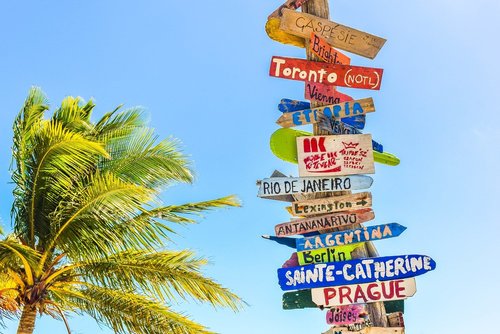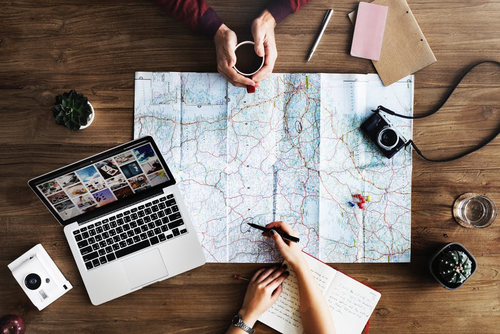But wait, there’s something we’re forgetting… Finances. Arguably the most important thing to plan for a big trip! Travel can be a costly hobby, and getting your money straight well ahead of time is essential.
If you’re planning (or thinking of planning) an international trip in the near future, here are six things you can do to plan and prep your wallet for the experience.
1. Research All Costs
We have full faith in the fact that you’ve thought about how much your plane tickets will cost, and maybe even set a budget for what kind of accommodation you can afford. However, there’s a lot more to it than just that.
Travel (especially international travel) comes with an endless amount of little expenses that can add up to a major blow if you haven’t planned accordingly.
Think about everything you might need to spend on your trip. From big, important expenses like international travel insurance to little things like souvenirs you might like to buy for your friends. Set a budget for all of it and try to stick to that number.
A significant amount of budget should also be present for sightseeing and entertainment.
2. Make a Budget and Include Contingency
When you’re in the process of budgeting for your trip, it’s easy to have the “it’ll be fine” mindset. By this, we mean you might think that a few dollars here and there for this and that will be enough, only to be caught off guard when you realize you actually need to spend double or even triple what you planned.
This is why having a safety net or simply over-budgeting for your variable expenses is a good idea. Of course, if you’re working with a strict budget, this might not be possible, and you may need to get more creative about where you can snip expenses so you can spend more in other areas.
3. Choose Cheap Destinations
If you are on a budget or want your money to go further why not try to travel closer to home, or to a destination which is less expensive?
You can travel in Asia or South America for around 3 months for the price of 1 month in Australia, Europe and North America. Choose your destinations carefully and you will get much better value for money.
Also try to avoid peak times of year too like summer and Christmas where prices skyrocket.
4. Avoid Unnecessary Expenses
If you really want to go on a trip, discipline yourself by not wasting money on things that you do not need. If you have a bad habit of impulsive buying, bring only cash for transportation and other daily expenses.
Do you really need that gym membership, new phone or clothing? Cut down on your extra expenses and don't spend on unnecessary things and you will soon find extra money building up.
5. Book In-advance
Be sure to book everything well before your departure date, or last minute and you will get much better value for money.
6. Get Multiple Income Sources
Having just one financial source might not be enough to finance your trip, especially if you want to travel longterm or visit expensive destinations. What you may want to do is to find other employment options.
You could find a career which allows you to work freelance, or apply to work abroad. There are lots of options, a popular route includes taking a TEFL certification program and then teaching English abroad.
Everyone loves to travel and although. We may not have the necessary finances at the moment, but this should not hinder us from going on trips. With the tips mentioned, you can reach for that dream trip and be a smart traveler.
Or if you have the necessary skills, you can do freelancing. There are many freelancing jobs available online such as writing jobs, editing jobs, and customer service jobs. If you have entrepreneurship skills, you can build a small temporary business, so you can earn as much before you leave for the trip.
7. Get a Loan
If you really want to travel you could consider taking out a loan to provide the funds for your trip, it might be wise to take a personal loan which are flexible. This means that they can be applied to multiple purposes, depending on your financial need. For trips, banks and lenders may offer an unsecured type of personal loan.
However, you might have to check your credit score first, as such a score determines whether you’ll get a personal loan or not. Check on how credit score is calculated before loaning. If you have a good credit score, applying for a loan is quite easier than when you have a poor credit score.
Applying for funding also doesn’t have to be as daunting as it sounds. Enterprising individuals or small business owners can also grow their ventures while accruing travel funds by exploring business growth financing solutions, such as SBA loans.
8. Plan for Currency Exchange and Differing Costs
Another thing to remember while budgeting is that the cost of things might look a little different in another country, and you also have to account for the exchange rate.
For example, restaurant visits might cost more than you’re used to in your destination. On the other hand, public transport might be cheaper than you plan for! This is why doing research on your destination beforehand is a good idea.
If you can, find some locals to talk to online, who might be willing to assist you with the estimated costs of the things you’d like to do on your trip. This can help you come up with a more accurate budget.
9. Notify Your Banks
News flash: your bank might get suspicious if your card suddenly starts making transactions in a country on the other side of the world. This is why you need to let them know of your travel plans.
Being stuck in a foreign country with a blocked credit card is a rather unexciting holiday prospect. You’ll need to notify your banks of the areas you’ll be traveling to, as well as the dates you’ll be there, to avoid your card getting blocked for suspicious activity.
You can also discuss foreign transaction fees and currency conversion fees to aid in your financial planning, or you can even consider getting a travel credit card to avoid those kinds of fees.
10. Plan for Emergencies
Having a little backup in your budget is important in case you decide to spend extra on a restaurant visit or book a spontaneous activity while on holiday. This is all part of the fun, and it’s important you can afford to do so!
However, it’s also crucial to consider the possibility of real emergencies, such as medical issues or a sudden change in travel plans. Your emergency backup could take any form you like – whether that be travel insurance, a specific emergency fund that you’ll have immediate access to even when you’re abroad, or something else.
Whichever option you choose, make sure you’re financially prepared before embarking on your trip.
11. Keep Backups of Important Information
Finally, in the vein of emergencies, make sure you know who to contact in the case of any issues in the financial department.
If you take out an insurance policy, you’ll need to have those details on hand if anything happens to you, your luggage, or perhaps even your transportation. You’ll also want to have access to your bank details and a contact person in case you struggle to access your funds while in a foreign country.
Start Planning Your Next Trip
An international trip can be exciting but also daunting and it's in your best interests to take any steps possible to lessen that stress and prepare yourself for whatever might come up.
Finding money to finance travel isn’t easy, especially when such trips can end up costing a lot when you include accommodation, transportation, food and sightseeing.
Having a normal 9-5 job may not be enough to cover the cost of travelling more often and savings might also not cut it, especially when you still have daily expenses to provide for.
However, money shouldn't hinder you from taking that much-needed breaks more often. Hopefully our financing tips will help you to achieve your dreams and book your next trip.







